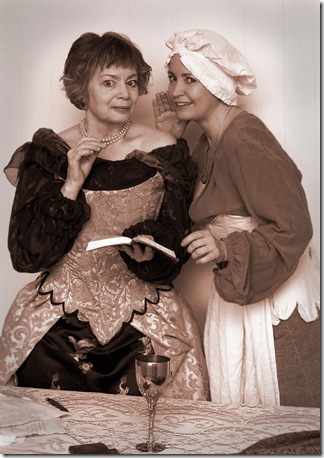The Secret Life of Emily / Frances
Laurie Fyffe and Michelle Leblanc. Photo: Annette Hegel.
The Bytown Museum, with its historical atmosphere, physical references to the founding of Ottawa and the life of the early settlers in the area, provides the most perfect set one could imagine for this performance. It takes place between 1764 and 1769 between London England and Quebec City, several years after the battle of the Plains of Abraham (1759) when France lost its most important colony in North America. Laurie Fyffe incarnates the British playwright/novelist/essayist and translator, Frances Brooke (1724-89) annoyed by the male dominated theatre milieu in London, after her last play, Victoria was rejected by the reading committee. Her husbad is pastor in the the new British Colony in Quebec, “ that orphaned colony of French peasants” and she is rushing out to join him where she hopes to discover a new land, and revive her work as a writer. She arrives accompanied by her French maid Manon (Michelle LeBlanc) and the story explains how they pass those three years in Quebec City, discovering the history of the country, the elegant social and cultural life of the new British colony with all its military personal, and trying to adapt to Canadian winters which are unbearable.
Within this “ruined” city, Mme Brooke paints us a picture of the defeated Quebec from the unusual perspective of the English heroine of her new book about Canada that she is now writing, a certain Emily Montague, Therefore we see the life of Mme Brooke, the life of Manon, the characters that Brooke portrays in her writing which are also played out by Manon through a second level of script reading and story-telling. This story within a story takes on layers and layers of interpretation, leaving us with the impression that the script (text) is perhaps a bit too ambitious for a one hour performance at the Fringe. Every phase is packed full of social references and name dropping to the point that I was not always sure who was who and what their social positions were and because all this was exceedingly important, I felt that at times I was missing the basic thread of the narrative. The only exception was the wonderful moment when Mme Brooke realizes in the course of her conversation with Manon/Michelle/Emily, that in fact Emily was trying to understand this new world and was not yearning to return to England because she had fallen in love with a handsome military man who would no doubt change her life. Emily represented the future of the colony and that gave the author new inspiration.
Michelle LeBlanc performs her different personalities of varying classes very well and Laurie Fyffe is a fine Frances Brooke but they are submerged by the narrative demands of a text that forces them to carry on at quite a clip, while they pull us along as willing but slightly confused spectators. Parallel to this , we learn that Frances Brooke is still corresponding with her old friends from the London Theatre milieu and she is preparing her comeback in spite of the fact she left London in a huff when the male dominated theatre milieu of Drury Lane and Covent Garden refused her last play!
Will Frances Brooke succeed? Will Emily find happiness in the new world? This is historical soap opera tinged with a good dose of British romantic sensibility of the period, which Laurie Fyffe’s Jane Austin style dialogue captures rather well. It nevertheless appears that Mme Brooke will soon triumph back in London and have a hit on her hands but for the moment, the Ottawa Fringe has Laurie Fyffe’s play at the Bytown and unless the author from Ottawa is seriously thinking about writing a novel and not a play, the spoken script needs a bit more work.
The Secret Life of Emily plays at the Bytown museum …
By Laurie Fyffe, directed by Bronwyn Steinberg.
With Laurie Fyffe and Michelle LeBlanc.
Costumes by Vanessa Imeson
Presented by the Cleopatra Conspiracy.
